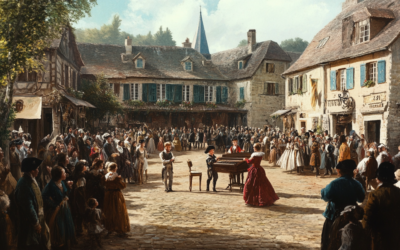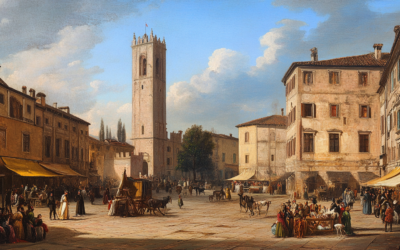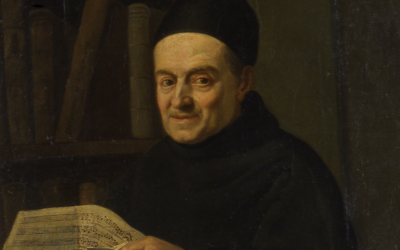Leopold Mozart
A Portrait in Shadows
Leopold Mozart, father of the famed Wolfgang, led a life filled with missed opportunities, deceptions, and an unrelenting quest for recognition.
From his university expulsion for negligence to his web of lies to secure marriage approval,
Leopold’s life unfolded in a pattern of ambition and pettiness, casting an unsettling light on a man whose moral uprightness was, at least outwardly, his badge of honour.
Mozart: The Fall of the Gods
This book compiles the results of our studies on 18th-century music and Mozart, who has been revered for over two centuries as a deity. We dismantle the baseless cult of Mozart and strip away the clichés that falsely present him as a natural genius, revealing the contradictions in conventional biographies. In this work, divided into two parts, we identify and critically analyze several contradictory points in the vast Mozart bibliography. Each of the nearly 2,000 citations is meticulously sourced, allowing readers to verify the findings. This critical biography of Mozart emerges from these premises, addressing the numerous doubts raised by researchers.
"One cannot help but admire a man who could lie so boldly, even about his own father’s death, just to secure a better future."
Mozart: The Fall of the Gods
The Father of Wolfgang Mozart: Ambitions, Deceptions, and a Life of Humiliation and Compromise.
A Ribellious Youth
Leopold Mozart was far from the upright figure he liked to project, and his early years bear witness to this fact. Born in Augsburg, the son of a bookbinder, Leopold might have followed his father’s craft. Yet, with the pretence of an ecclesiastical calling, he deceived his father and enrolled at the University of Salzburg, benefiting from the hospitality of the Benedictines. However, his tenure there was short-lived: despite a promising first year, he was soon reprimanded for neglect and was unceremoniously expelled in 1739.
The Deceptive Path to Marriage
Years later, Leopold continued his pattern of deceit. Having fallen for Anna Maria Pertl, a young woman of humble origins, he sought his mother’s approval for the marriage and even requested an advance on her dowry. In his appeal to the Augsburg city council, he presented a wholly fabricated story: he claimed his father had recently sent him to Salzburg to study, and that he was now gainfully employed as a “valet” for a high-ranking noble. He further asserted that his bride-to-be was the daughter of a wealthy citizen, a fiction as bold as it was unfounded. Solomon remarks on the audacity of Leopold’s claims, pointing out that his father was, in fact, already deceased, that Anna Maria had no affluent lineage, and that Leopold held no such prestigious employment.
A Life of Discontent and Humiliation
Leopold’s struggle for recognition in Salzburg brought him only disillusionment. Though he served in the court orchestra, he never ascended beyond the rank of Deputy Kapellmeister. In 1753, his career nearly ended in disaster due to an anonymous pamphlet he had circulated, ridiculing several prominent ecclesiastics. His punishment was public and humiliating: he was forced to beg forgiveness, and the pamphlet was symbolically torn to pieces at his feet.
The ‘Virtuous’ Father
Despite his troubled path, Leopold clung to the veneer of a righteous, disciplined man—a character description belied by his actions. His son Wolfgang’s musical prodigy brought him some satisfaction, yet Leopold’s own life was steeped in compromise and disappointment. Florian Langegger, a contemporary, commented on Leopold’s strained family relations, including his troubled dealings with his mother, whom he blamed for supporting his other siblings while doubting his loyalty.
You May Also Like
Leopold’s Invisible Hand
Behind the glittering performances of young Wolfgang and Nannerl Mozart lay the meticulous guidance of their father, Leopold. Often considered a mere teacher, Leopold’s role in composing and shaping their early musical successes has been largely overlooked. Was the child prodigy truly a genius, or was it Leopold who orchestrated his son’s rise to fame?
Debunking the Romantic Virtuoso Image
The image of Mozart as a Romantic-era virtuoso is a misleading anachronism, fuelled by 19th-century propaganda. Wolfgang was no transcendental pianist, but a product of an era where music was more galant than heroic.
The Visit to Verona
In Verona, young Wolfgang Mozart impressed the local nobility, but the reality behind the scenes reveals a carefully managed public image, where strategic networking and curated praise played key roles in shaping his growing reputation.
Mozart’s Training
The myth of Mozart’s genius is nothing more than a carefully crafted illusion, propped up by misplaced attributions and romanticised biographies. Behind his so-called brilliance lies the reality of his father’s dominating influence and a lack of formal education.
From London to Vienna
The Mozart family’s journey from London to Vienna was marked by illness, failed opportunities, and the relentless ambition of Leopold Mozart, revealing the pressures and challenges behind the facade of success.
The Ambiguous Legacy of Leopold Mozart
This post explores the multifaceted and often controversial life of Leopold Mozart, providing insight into the complexities and contradictions that defined his career and legacy.







